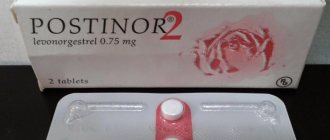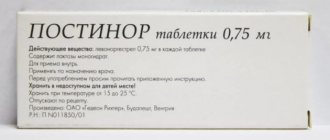Last update: 02/10/2019
It happens that unplanned events occur in a woman’s personal life that require urgently taking emergency contraceptive measures: a sudden impulse of passion or, God forbid, rape. Then Postinor comes to the rescue - a drug that eliminates unwanted pregnancy due to the content of the hormone levonorgestrel. Taking the pill in a timely manner after unprotected intercourse in 95% of cases prevents fertilization of the egg. However, the price of such convenience is hormonal disorders in the body that affect the menstrual cycle: menstruation after Postinor changes the date of arrival, the nature and amount of discharge.
- Action of Postinor
- When to expect your period
- Reasons for delay
- Features of menstruation
- Complete absence of menstruation
Action of pastinor
The drug we are considering is of synthetic origin, which has a contraceptive effect and has pronounced gestagenic and antiestrogenic properties. If you follow the recommendations for use, it can suppress the process of ovulation and fertilization if unprotected sex took place during the pre-ovulation phase, when the likelihood of becoming pregnant is most likely. Postinor can lead to changes in the endometrium to prevent implantation of the embryo into the uterine wall. The drug is not effective if implantation has already taken place.
If we talk about the level of overall effectiveness, we can refer to statistics according to which Postinor prevents pregnancy in approximately 80% of cases. The tablet should be taken as quickly as possible after intercourse; the strength of the postinor decreases with each passing hour. If you take the drug within 24 hours, you will increase the likelihood of avoiding fertilization to 95%. Up to two days - 80%. If you take Postinor on the third day, the chance of getting pregnant will be 50%. In cases where more than 72 hours have passed after sex, taking the drug loses its meaning.
A week later the brown spot started
A week after using Postinor, dark spotting may appear, which can last from 1 to 7 days. This is considered a normal reaction and does not require treatment. The manifestation of such signs is evidence of complete cleansing of the genital organs. Often such spotting turns into full menstruation, then its duration increases to two weeks. Such symptoms cannot be ignored only in cases where they do not end and continue for two weeks or more, and are accompanied by pain and malaise.
Brown discharge as a result of using the drug Postinora can appear if it is used incorrectly or if it is overdosed. You cannot take the drug repeatedly in one cycle, as this can cause heavy bleeding, which can most often be stopped only by curettage.
Application and dosage
The drug is taken orally. You will need to take two tablets during the first three days after unprotected intimate contact. The second tablet is taken 12 hours after the first, the gap between doses should not exceed 16 hours. To achieve the most effective results, you need to take the tablets as early as possible.
Please note that if vomiting occurs within three hours after taking one of the tablets, you need to take an additional tablet of the drug. The drug can be used on any day of the cycle. If you have irregular periods, you will need a preliminary check to rule out pregnancy.
After you have taken emergency contraception (postinor), before your next period begins, you must protect yourself with a local barrier contraceptive, such as a condom. Experts strongly do not recommend using the drug repeatedly during one cycle, including due to an increase in acyclic bleeding.
Side effects
Allergic reactions, rashes in the form of hives, other rashes, itching, and swelling of the face may occur.
It is possible that after taking it you will encounter a number of other side effects that do not require additional therapy with medication, these include:
- vomit,
- the appearance of diarrhea,
- migraine,
- dizziness,
- pain in the mammary glands,
- cycle failure in the form of a delay of up to 7 days (if longer, you need to get tested or do a test, fertilization may have occurred)
What should your period be like?
After Postinor, menstruation comes on time. This is due to the fact that the medicine is not aimed at causing a miscarriage, but at creating conditions under which fertilization is impossible.
The duration of the first menstruation after using the medicine also does not change in most cases. Critical days last 3-7 days. The drug increases blood clotting.
Often, after Postinor, menstruation ends faster than usual. This is due to the formation of blood clots, which prevent bleeding from going on for too long.
Contraindications
This drug is not as harmless as the advertisement may claim; its action causes severe stress for the body, and in some cases its use is out of the question.
Postinor should not be taken:
- teenagers under 16 years of age;
- women suffering from severe liver failure;
- during pregnancy;
- for hereditary diseases associated with acute intolerance, lactose deficiency, as well as glucose-galactose malabsorption;
- people with hypersensitivity to the composition of the drug.
The drug is used with extreme caution:
- in the presence of liver diseases
- problems with the biliary tract;
- patients with jaundice;
- with Crohn's disease;
- during the lactation period.
Reception during pregnancy and lactation.
The use of Postinor is strictly prohibited during pregnancy. If it occurs when using this drug, as studies show, postinor does not have any adverse effects on the fetus. One of the components contained in the tablet, levonorgestrel, passes into breast milk after administration. Therefore, breastfeeding is stopped for a 24 hour period after taking the drug.
If renal or liver function is impaired, and if there are abnormalities of the biliary tract, postinor is prescribed with caution. It is prohibited for people with severe liver failure. There is no data on the use of the drug for renal impairment.
General instructions for use
The drug is used exclusively as a means of emergency contraception. Repeated use during one cycle is not recommended. The reliability of the postinor decreases according to the amount of time that has passed since unprotected love.
Postinor, under no circumstances, should be perceived and used as a means of permanent contraception. Sometimes, the use of postinor does not affect menstruation. But after taking it, you may also experience non-cyclical bleeding and delayed menstruation lasting several days. If there is a delay, your periods are absent due to the use of the drug for more than a week, or you notice a change in their characteristics, for example, unusually scanty or, on the contrary, heavy bleeding appears, you must do tests to rule out pregnancy and consult a doctor. If there is severe pain in the lower abdomen or fainting, this may be evidence that you have an ectopic pregnancy.
There are contraindications for the use of postinor before the age of 16. However, in some special cases, for example, if rape has occurred, the drug is sometimes used after consultation with a gynecologist. When carrying out emergency contraception, you need to contact a specialist who will select the most appropriate method of protection in the future. Please note that the effect of postinor is not aimed at protecting against diseases that are transmitted through sexual contact.
If you have impaired gastrointestinal tract function, the effectiveness of the drug will most likely be reduced.
How does the reproductive system react to taking Postinor?
Emergency contraception works due to the presence of a high dose of hormones. In Postinor, this is levon-regstrel, which affects the reproductive system in the following way:
- inhibits ovulation, preventing the egg from maturing and descending into the fallopian tube;
- reduces the speed and ability to fertilize sperm in the female genital tract;
- stimulates the endometrium to rapid development and rejection.
These properties provide a contraceptive effect. A few days after taking it, the woman notices bleeding. They last 4-5 days with varying intensity. This is the rejected layer of the uterine mucosa, as well as evidence that the danger of unwanted pregnancy has passed. However, the latter cannot be considered a 100% sign; you need to make sure that the effect is achieved using a test.
Interaction with other drugs
The main component of the drug, levonorgestrel, is active in preventing pregnancy; a number of other drugs can reduce its effectiveness when taken simultaneously, which is undesirable.
The following drugs may reduce the effect of taking Postinor: nevirapine, amprecavil, oxcarbazepine, lansoprazole, topiramate, tacrolimus, barbiturates, tretinoin. In addition, the use of St. John's wort and preparations containing it should be excluded. Postinor itself will reduce the effect of anticoagulant and hypoglycemic drugs and increase the plasma concentration of GCS. The drug, due to its levonorgestrel content, may increase the risk of toxicity from the drug cyclosporine due to suppression of its metabolism. In connection with the above, when consulting with your doctor regarding taking postinor, be sure to name the medications you are taking in addition to it, if any, in order to avoid antagonistic reactions.
The drug should be stored at a temperature of 15°-25°C; children should not have access to it.
Disruptions in the menstrual cycle
Any emergency contraception may cause your periods to become irregular.
Postinor contains the synthetic hormone levonorgestrel in large quantities, for this reason, even if you use the drug once, it will not go unnoticed for the body.
So don't be surprised if you experience a delay or unscheduled bleeding. It is very difficult to say exactly when your period will come in each case; you just need to wait.
As a result of taking the drug, you may experience spotting after a few days. Such a manifestation most likely indicates that the postinor worked and conception was avoided. On the contrary, menstruation may come later than usual, sometimes severe blood loss occurs. When more than one pad is needed within three hours, consult a doctor immediately.
What to do if there is a delay, menstruation does not start? In many cases, taking emergency contraception will extend your cycle by a week, but this is not always the case. Delay is one of the side effects. In any case, it would not hurt to test for pregnancy, which could occur despite taking the pill.
The test does not always give a 100% correct answer, so it doesn’t hurt to do a hCG test. It will show a more accurate result and accurately determine the presence of pregnancy. The drug helps suppress ovulation and greatly reduces the likelihood of fertilization, causing changes in the endometrium, as a result of which fetal implantation is excluded. If the egg managed to attach to the uterus, then the drug had no effect.
The fact that menstruation began on schedule is not always a consequence of pregnancy. Their absence, even over a long period, in most cases indicates a serious hormonal imbalance. As you can see, the drug is not harmless. After its use, additional corrective treatment may be necessary, but please note that a one-time use may go away without a trace, while periodic use of the drug can lead to ovarian dysfunction and infertility. Under no circumstances violate the instructions for use and do not get carried away with using postinor.
Possible reasons for the delay
Delayed menstruation after postinor is also a fairly common occurrence. Nevertheless, the hormone contained in the drug has a strong influence on the functions of different parts of the reproductive system. Therefore, the product is allowed to be used no more than 2 times a year, provided that the woman has a regular menstrual cycle. But compliance with all the rules of admission does not guarantee that the reproductive system will not go on strike in the future. If you don’t get your period after postinor, there may be several explanations for this:
| Cause | Why was there a delay? |
| Increased blood clotting | When the indicator is initially high, it can increase even more from taking postinor. The vessels that make up a significant part of the uterine mucosa will not easily release biological fluid out. Hence, not only a delay is likely, but also such a phenomenon as scanty periods after postinor, when the critical days finally arrive. |
| Violation of drug use | First of all, this is a change in the timing of admission. The effectiveness of postinor is also affected by alcohol, from which it is better to abstain completely while the effect is expected. |
| Use of other medications simultaneously with contraception | Some pharmaceuticals taken on a regular basis or taken at the same time as postinor can neutralize its effect. If a woman has taken medications for HIV infection (Niverapin), stomach ulcers (Lansoprazole), or barbiturates, a delay in menstruation may be caused by combining them with a contraceptive. The same undesirable effect is produced by the simultaneous use of drugs based on St. John's wort, drugs for tuberculosis and epilepsy (Oxcarbazepine), as well as strong antibiotics. |
| Minor hormonal imbalance | The presence of an atypical amount of levonorgestrel in the blood can disrupt the functioning of the reproductive system even in a gynecologically healthy woman. The acceptable delay in this case will be up to 7 days. The other extreme that postinor can cause is that your period comes earlier. This is not scary, as it has a natural explanation. The drug contains a hormone that controls the second phase of the cycle. That is, levonogestrel accelerates all its processes, hence the faster arrival of critical days. A similar manifestation is more likely if the drug was taken in the luteal phase, in which the natural concentration of gestagens is high. |
| Severe hormonal imbalance | This is possible under any conditions, but is more likely with frequent use of postinor or existing hormonal problems. Levonorgestrel can disrupt the functions of the ovaries and even the pituitary gland. And months after using a contraceptive, the maturation of the reproductive cell may encounter difficulties and remain inhibited. The presence of levonorgesterl suppresses estrogens, which are responsible for its secretion and readiness for release. |
| Ignoring contraindications to the use of the drug | Postinor is prohibited for use by women who have problems with the liver, gall bladder, or who have had hepatitis. The body’s reaction in this case is not only a prolonged absence of critical days, but also a deterioration in the general condition. |
| Use of Postinor in adolescence | The menstrual cycle, like the hormonal composition, has not yet reached the necessary balance. Interfering with the process of their formation with a strong dose of levonorgestrel can cause not only a prolonged absence of menstruation, but also breakthrough bleeding and deterioration of well-being. |
| Pregnancy | Its possibility has already been mentioned; it is not completely excluded even if the contraceptive is used absolutely correctly by a woman whose cycle was clear and problem-free. When there is no menstruation for a month after postinoration, there is reason to suspect that the embryo is still implanted in the uterus. This condition requires testing, but does not allow repeated use of a contraceptive in order to get rid of a diagnosed conception. There is a danger of bleeding here. |
| Adverse reactions of the body to Postinor | An increased concentration of levonorgestrel in it can be detected not only by drowsiness, headache and skin rashes. It can also cause nausea, vomiting and diarrhea. And in this case, some part of the substance may not be absorbed, and accordingly, the effect of the drug on the endometrium will decrease. Its development and rejection can be slowed down due to changes in the balance of hormones. |











